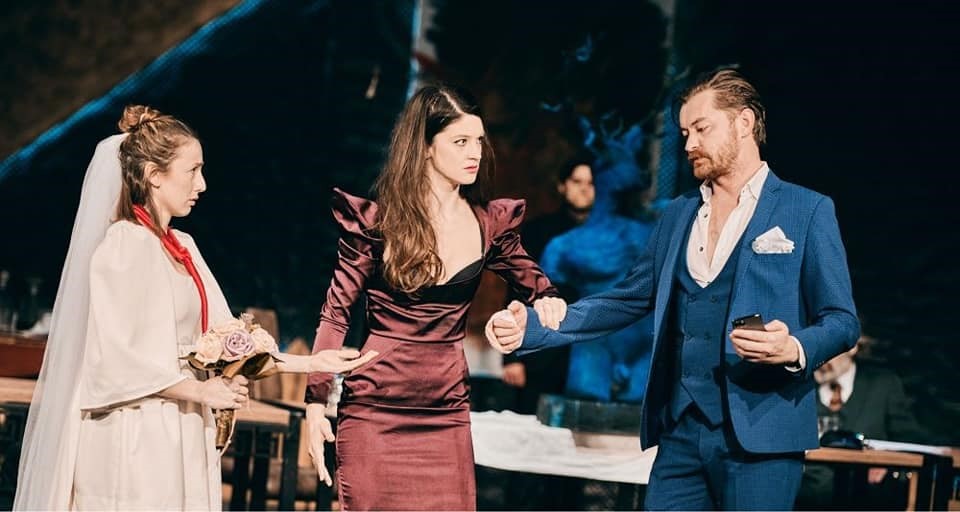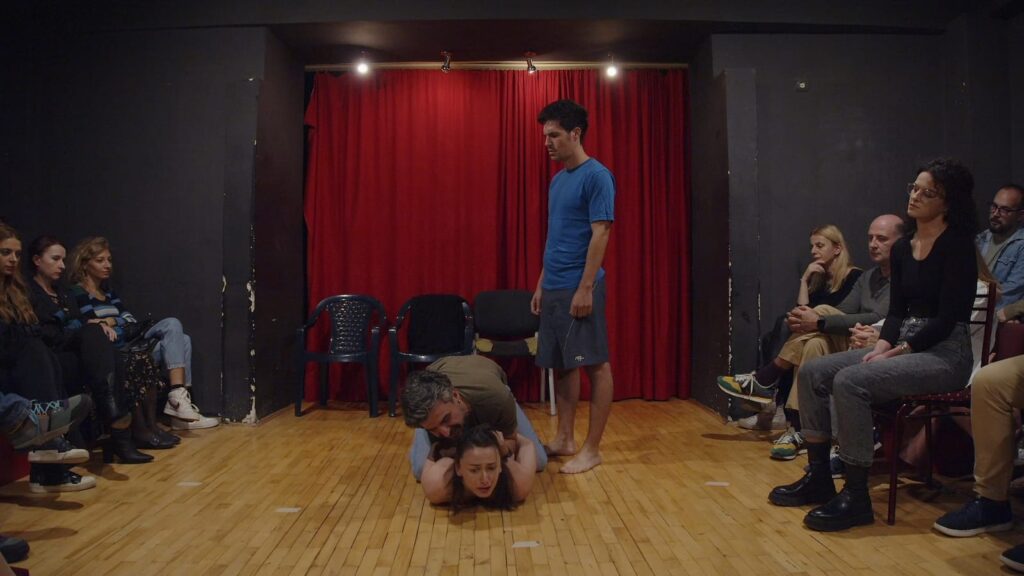Director Zoran Rakočević takes to Nick Awde about the work of his company Korifej, putting on a theatre festival in a small Montenegrin mountain town and helping to bring Zlatko Paković’s banned play to the stage.
An international theatre festival in a mountain resort of less than 5000 souls in the north of Montenegro? “When people come to Korifej, our festival in Kolašin, they are always a little astonished to see how it is possible in such a small town,” says festival director Zoran Rakočević. “And the answer is simple: we were very enthusiastic when we started.”
So here’s the back story… A group of budding theatremakers from Kolašin formed KLAP, a company that swiftly made its mark on the amateur festival circuit. They took shows across Montenegro, the Balkans and Romania, winning over 50 awards in the process.
“One by one we then started to enrol at the Faculty of Dramatic Arts,” Rakočević recalls. “It’s the only official drama school in Montenegro, under the University of Montenegro, and it’s based in Cetinje, the former royal capital of Montenegro which is also the official residence of the president of the republic. At one point we composed 25 per cent of the students there – I was the theatre director student. Even though after we graduated most of us stayed in Cetinje or moved to Podgorica, we decided that we would continue to do something for our hometown.”
Surrounded by picture-postcard mountains, Kolašin is a winter and summer tourist attraction, and the idea of a theatre festival in July and August seemed as promising as it was logical. And so, starting in 2014, the first three editions of the Korifej International (initially Regional) Festival of Alternative Theatre took place with the support of private backers who wanted to help to boost culture in the area.
“Then when they lost their enthusiasm, we stayed enthusiastic and saw it as an opportunity to run the festival as Korifej Teatar, the NGO we formed in 2017. The new organisation gave us the base to apply for funds from the municipality and the Ministry of Culture & Media, meaning that we were also able develop our own professional productions.”
If funding hasn’t exactly grown since then, the festival definitely has. The 2023 ninth edition programme boasted 26 shows, films and events from seven countries, including plays from both national theatres – the Montenegrin National Theatre’s Mali bračni zločini and the Royal Theatre Zetski Dom’s Obožavateljka.
Korifej Teatar (i.e. Chorypheus, leader of the classical theatre chorus) produces throughout the year and presents one or two shows each August at the festival. This year you would have caught Twilight in the Maple Garden/Suton u javorovom vrtu, a domestic drama based on a text by Montenegrin writer Vasko Raičević and directed by Rakočević. Also in the programme was How I Learned to Sleep Upside Down/Kako sam naučila da spavam naopacke, a pilot project for a new children’s play plus workshops written by Đorđije Tatić and directed/performed by Anđelija Rondović.
 Korifej-produced plays move on after the festival – Twilight in the Maple Garden has already transferred to Podgorica, while the most successful production so far is 2021’s Ifigenja. Directed and adapted by Rakočević, it’s a co-production with the cultural centres of Kolašin and Bijelo Polje that has regularly toured for the past two and a half years.
Korifej-produced plays move on after the festival – Twilight in the Maple Garden has already transferred to Podgorica, while the most successful production so far is 2021’s Ifigenja. Directed and adapted by Rakočević, it’s a co-production with the cultural centres of Kolašin and Bijelo Polje that has regularly toured for the past two and a half years.
“I would say that Ifigenja has made us made us stronger as a company, it gave us some power to continue and it has challenged us to continue on our journey as producers and as festival organisers. We are very happy to see how in a relatively short period a festival can grow. We don’t have a big team and everything still depends on couple of us having a couple of months free during the summer to organise everything.
“Although we have serious companies coming to perform, the number one comment is ‘wow your audience is great!’, because it’s not expected in such a small town. But here you have people who have real knowledge and real expectations, and this is an audience that is composed of locals and the regular tourists.”
Korifej’s progress is positive because it challenges the accepted way of doing things, where principles trump economics. Ticketing for example is usually pay what you want. “We have boxes where audiences can put whatever they want after seeing the show and it’s very well received. We have people who come each year, and even if we run 20 days they come every night. I stay in the hall and tell them, ‘Please, you don’t have to put cash in the box every night, just accept our thanks for coming.’ But they still put the money in.”
This year Korifej also printed tickets for the first time, charging just two/three euros a show. “Tickets in this year’s European festivals were 10 to 25 euros, so two to three euros is a very symbolic price,” says Rakočević. “The main reason why we didn’t introduce tickets previously is that we were unsure about our NGO status. As the festival organiser we cooperate with the municipality and local cultural centre and we had discussions about how to issue tickets and what tax to pay. We have finally decided that they sell their tickets and we sell ours.”
Each year the festival takes a different theme. “Last year it was U kraju which means ‘in the end’ but it’s almost ‘Ukraine’. We couldn’t make all the productions anti-war and pro-Ukrainian but we did programme productions and speakers that strongly referenced peace and war. This year the theme was Bez censure – ‘no censorship’ – which we chose mainly because of two events that happened last year in Montenegro.”
After some years out of the theatre arena, Podgorica’s Secretariat for Culture and Sports decided to co-produce a new play entitled Pier Pasolini Directs the Last Judgement/Pjer Paolo Pazolini režira Strašni sud. Written and directed by Zlatko Paković, it turned out to be a highly charged political work revolving around the idea of when people die and the final judgment that awaits them in heaven, with two of the main characters being the current president of Montenegro and the patriarch of the Serbian Orthodox Church.
A script like this is hardly surprising given that Paković has been a regular target for censors throughout the region. “He’s radical and very direct,” says Rakočević. “Some will say that he’s politically incorrect, but for me he produces very correct life situations politically.”
Less than a couple of weeks before the premiere, the Secretariat sent someone to rehearsals to personally hand Paković a document that declared that the play would not be performed. The official explanation was that the director had not delivered the contractually agreed themes and that the play’s content was not compatible with the Secretariat’s values.
“The production had to stop. They’re still in court suing each other,” says Rakočević “But some of our actors were in the cast and, when no one else in Montenegro offered an alternative space to perform, we offered to continue the production even though we had no money. Zlatko was grateful but for us it was normal situation – if somebody bans you, theatre is there to act against that censorship.”

The performance of Pierre Paolo Pasolini Directs the Last Judgement
Sister theatre NGO Empty Space offered a small studio space in Podgorica, rehearsals resumed and Pier Pasolini Directs the Last Judgement (now with the subtitle ‘This is not what we agreed to’) finally had its premiere.
“We felt like we were playing from the catacombs,” recalls Rakočević. “When it was livestreamed it was seen by 8000 people, far more than the audience who could see it in person, maybe 300. We didn’t perform it again because the court case is still going on, but we are ready to restage it.”
The second event that inspired the ‘no censorship’ theme was the cost of living spiralling in 2022. The government announced that it would increase salaries but this proved to be wildly unequal across the sectors. For some the adjustment was generous and even the minimum wage was doubled – and yet the cultural sector was offered a tiny salary increase of around one and a half per cent. The actors led protests which also included musicians in order to convince the Ministry of Culture & Media to get the government to raise its offer to 25 per cent.
Bizarrely the ministry’s response was that the Sindikat Kulture (Culture Union) should decide. “And then,” laughs Rakočević wryly, “the union voted against the interest of their actors and musician members.”
The actors refused to back down and they continued to fight for a better deal, which they finally got when the prime minister listened and made a deal. For Rakočević these two events show clearly how there exist other forms of censorship in Montenegro, where a union works against its own workers, where a producer works against its own production.
The 2023 edition of Korifej set out to support every independent stage in Montenegro, including graduate productions, along with others from the region and, again, it wasn’t practical to have every play and event addressing censorship or the unequal status of actors. Rakočević however is proud that while not all were directly political, each spoke about freedom, particularly freedom of the artist.
“You could feel that there was a thread of shared experience in all the productions. A good example is Constitution/Ustav, which was five young people from Belgrade’s Reflektor Teatar who read and analysed the constitution of Serbia.”
Growing culture is however a major challenge in a town that may be popular with outsiders but whose population is visibly decreasing. “Our people are leaving to the bigger cities like Podgorica and Belgrade, which isn’t far,” says Rakočević, adding: “And it’s not just the economy that is being destroyed here in the north here but also our sense of morality because of the corrosive combination of overdevelopment and depopulation. This is why we need to make culture to make a difference.”
He points to Kolašin’s Summer Tango Camp festival. “I can openly say it’s bigger in the dance world than our festival is in the theatre world. The festival attracted so many people for years and then they just decided to stop. Five years later it’s back again and it draws people from four continents. They had 800 dancers this year.”
It was pressure from the locals that tipped the decision to restore Tango Camp, because people realised that the festival is as important for the community as it is for the tourists. As a tie-in acknowledging this, the audience for Twilight in the Maple Garden walked after the show to the square outside to experience Argentine tango with the band Chimi Chango. “Having Tango Camp back definitely gives us a new spirit. Sometimes I’m worried that one year we’ll find ourselves deciding to stop in the same way – and then we’ll see whether Kolašin needs us too!”
But that local connection is precisely the key to getting things done in Kolašin thanks to Korifej’s core of eight or so actors, director and a producer, who then gather a further 15-20 people to run the festival each August.
Reviving Kolašin’s public spaces is a big part of what they give back to the town – this year shows and events took place across seven locations including two public squares, the 300-seater Cultural Centre, a retirement home and the restaurant of the local ski centre – “I hope that we have encouraged people to come in the summer to see if there is anything new,” says Rakočević.
It may be a cliché to point out that culture is important because it brings people together and breaks down barriers, but it’s a cliché that Rakočević sees as being absolutely relevant to Montenegro. “Slovenia and, to an extent, Croatia decided that separation should not involve physical separation from other countries – they saw separation as a progressive process that has to work on many levels. All the other six countries only spoke about geographical separation, and when you separate yourself geographically then you have fulfilled your perfect dream of being separate, but you don’t have any plans for what comes after.
“Theatre is part of breaking down all these new barriers. One play per year or one 20-day festival cannot change our communal common sense or values, but we can share our opinions and influence the processes of change.”
For more information, visit: facebook/korifejkolasin
Further reading: review of Ifigenia
Further reading: Zlatko Paković, Pasolini and the Performance They Tried to Ban
Nick Awde is a journalist, playwright, editor, critic and producer. Based in the UK, he is co-director of Morecambe's Alhambra Theatre. Books include Equal Stages (diversity and inclusion in theatre), Mellotron, Women In Islam, and translations of plays by other writers. Much of his work focuses on ethnoconflict and language/cultural genocide.








